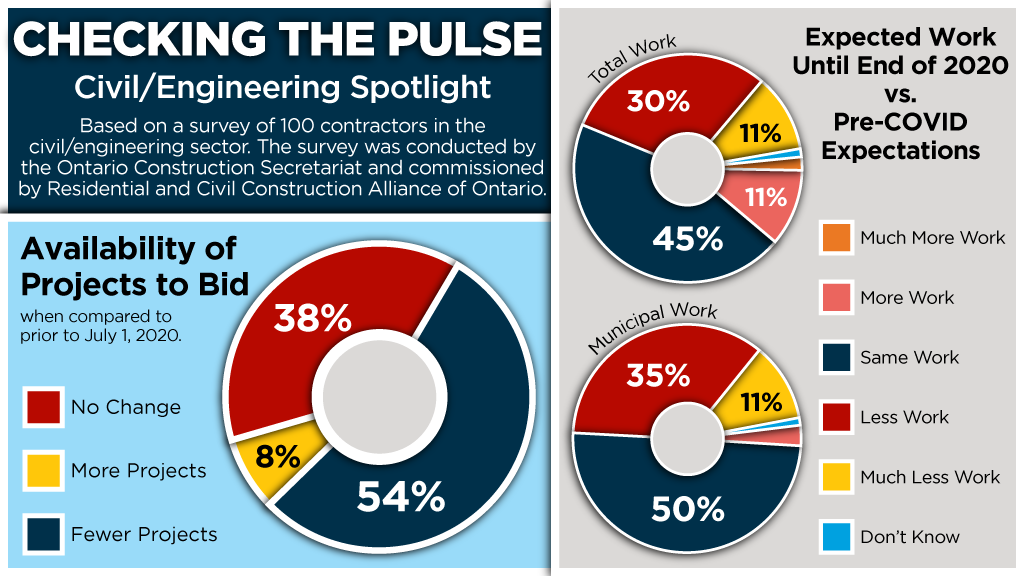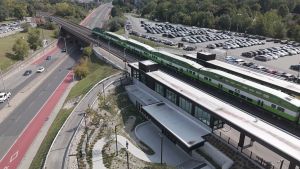An Ontario Construction Secretariat (OCS) survey focusing on the civil and engineering sectors finds contractors are experiencing concerns around the second wave of COVID-19 but are also worried about the drop in tenders and projects to bid on, especially municipal projects.
The survey, Coronavirus Contractor Survey: Spotlight on Civil/Engineering Sector, was conducted by the OCS and commissioned by the Residential and Civil Construction Alliance of Ontario (RCCAO).
The findings are part of a larger survey that was conducted at the beginning of October and included 300 ICI respondents, with 100 of those doing work in the civil and engineering sector. Forty-six percent of the civil/engineering contractors in the survey were trade contractors and 47 per cent were general contractors. This was the fourth survey done by the OCS since the pandemic began.
The RCCAO asked that the study be expanded to include the civil/engineering sector.
In addition to the impact of the second wave of COVID-19, other top concerns among civil and engineering contractors include the health and safety of workers, the ability to get skilled labour, the impact of supply chain disruptions and the ability of government to quickly roll out stimulus spending on infrastructure projects.
âFrom our perspective it was to see if there was this wider spread concern about the infrastructure stimulus spending,â said Andy Manahan, executive director of the RCCAO. Â
âWhen this survey was done in September there was a lot of media commentary about the potential for a second wave, so I think that was certainly on the contractors mind and maintaining the health and safety of workers and others on site was a linked concern.â
In terms of the availability of municipal projects to bid on since July 1, there were 42 per cent who said the same amount is available but 56 per cent said there are fewer projects.
âThere is virtually no one in this survey that said there is more work to bid on even though at the beginning of 2020 it looked like it was going to be a robust and active year in terms of construction projects, so we really have seen a dip in the overall activity,â said Manahan.
The survey found only three per cent of firms expect to do more municipal work in the September to December period compared to last year, while 46 per cent expect to do less. Forty-seven per cent of civil/engineering contractors expect to do less work in the same period compared to last year, while 19 per cent expect more work.
According to the survey, 37 per cent of respondents indicated there has been more competition for municipal work. Fifty-one per cent said there have been fewer small projects to bid on and 55 per cent observed that larger firms are now bidding on smaller projects.
âWhat we have been hearing is in some cases municipalities have been taking money out of the capital fund and putting it into operating so they can continue to run services because municipalities are not allowed to run a deficit,â Manahan explained. âItâs a major concern for the 2021 budgets that are coming up for a lot of municipalities.
âWe will continue speak to the federal government but also Queenâs Park to say the solution to this issue is more dedicated infrastructure funding,â Manahan added. âThe results of this survey reinforce our message that the federal government must provide the necessary funds for municipalities to get moving on state-of-good-repair projects.â
Other highlights from the survey include:
- Sixty-one per cent of civil and engineering contractors are anticipating revenue declines in 2020, compared to 2019, and 25 per cent report they will need government support.
- Fifty-four per cent said before the pandemic their business was growing, now only 14 per cent report their business is growing.
- Utility locates delays have been experienced by 32 per cent of civil/engineering contractors.
- Thirty-nine per cent of civil/engineering contractors had more difficulty getting skilled labour this summer (since July 1).
- Thirty-seven per cent expect it will be more difficult to get skilled labour compared to the September to December period last year, while 10 per cent expect it to be less difficult.
- Methodology
- Sixty per cent said the coronavirus was having a high or medium impact on their supply chains.
- Fifty-one per cent report that building permit processing was slower than usual this summer (since July 1).
Follow the author on Twitter .











Recent Comments
comments for this post are closed